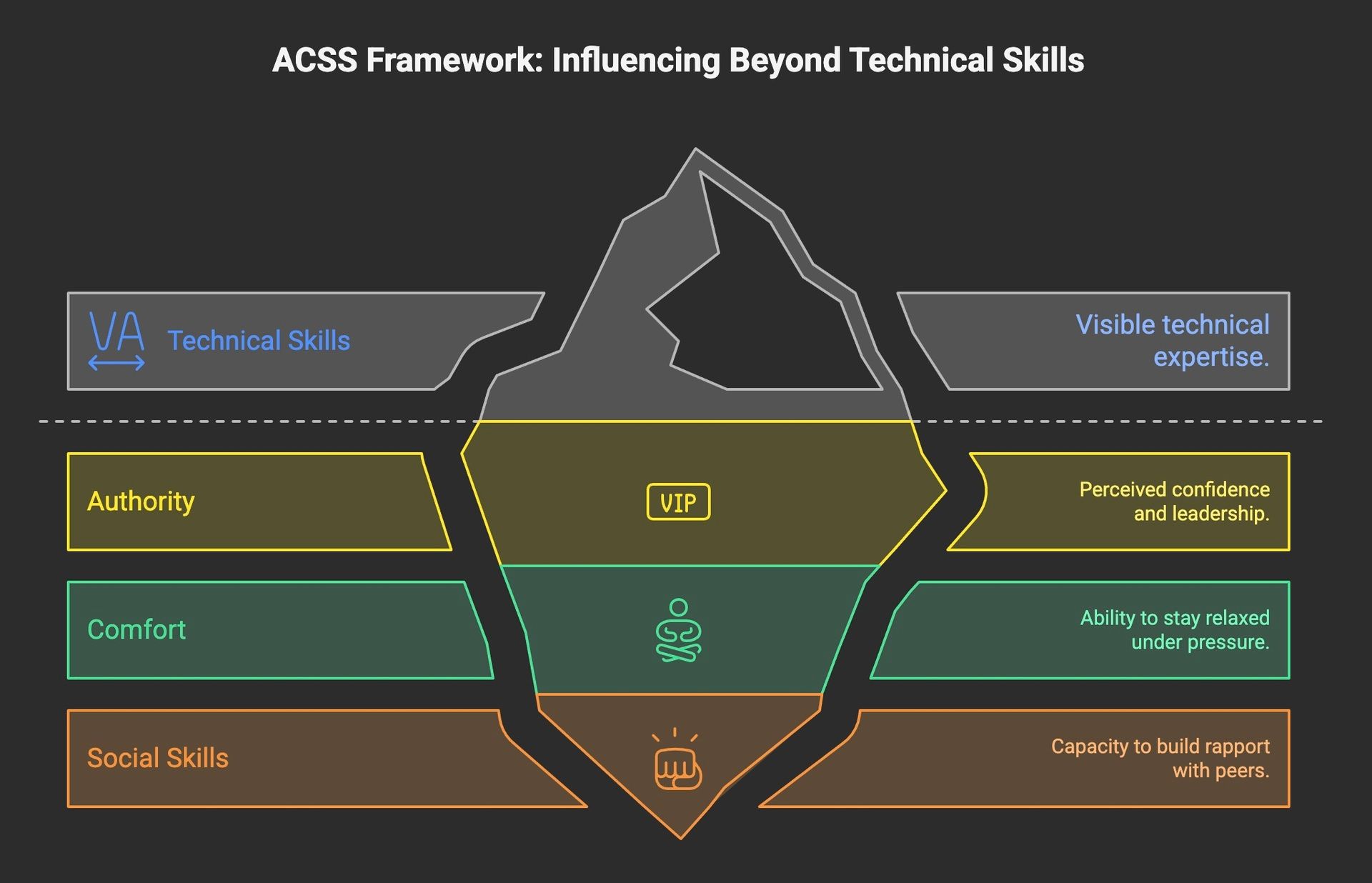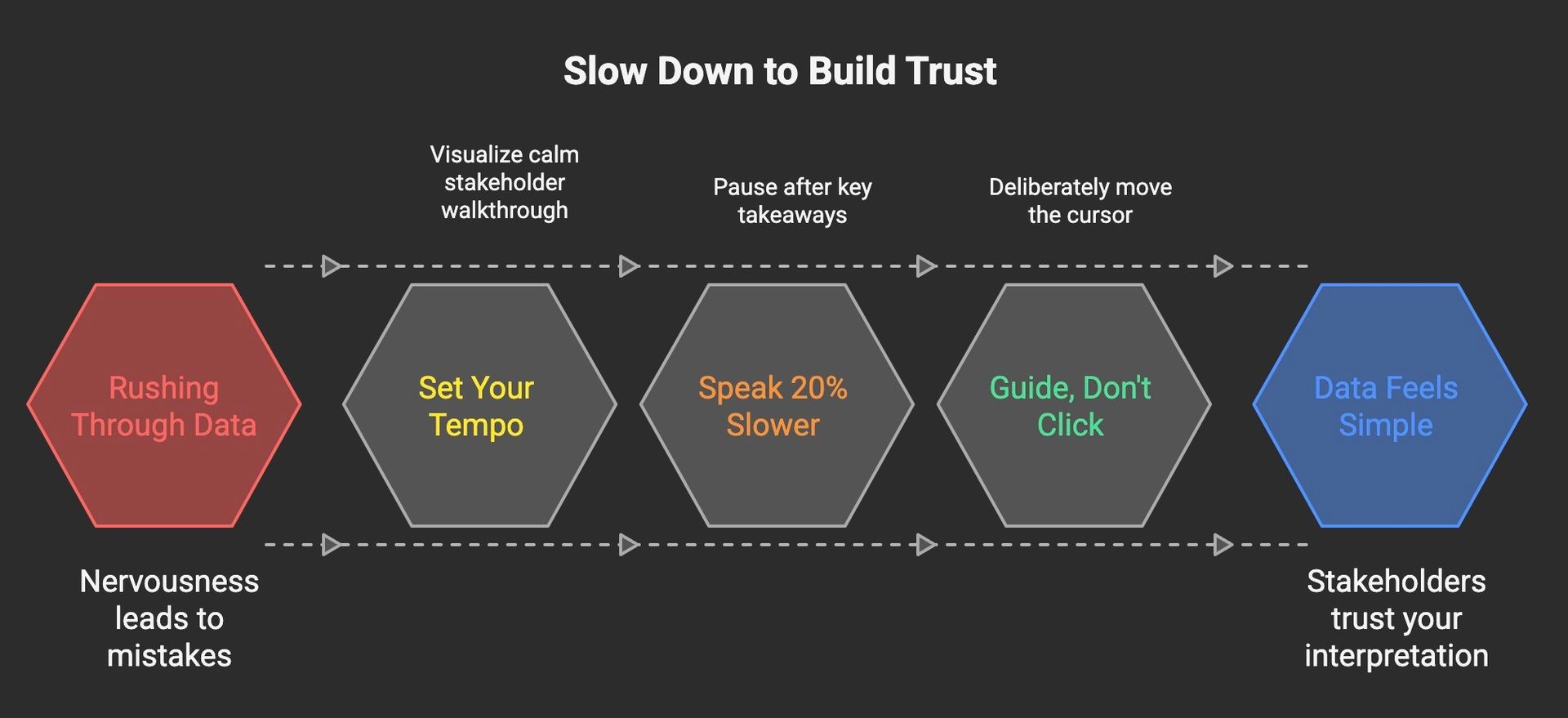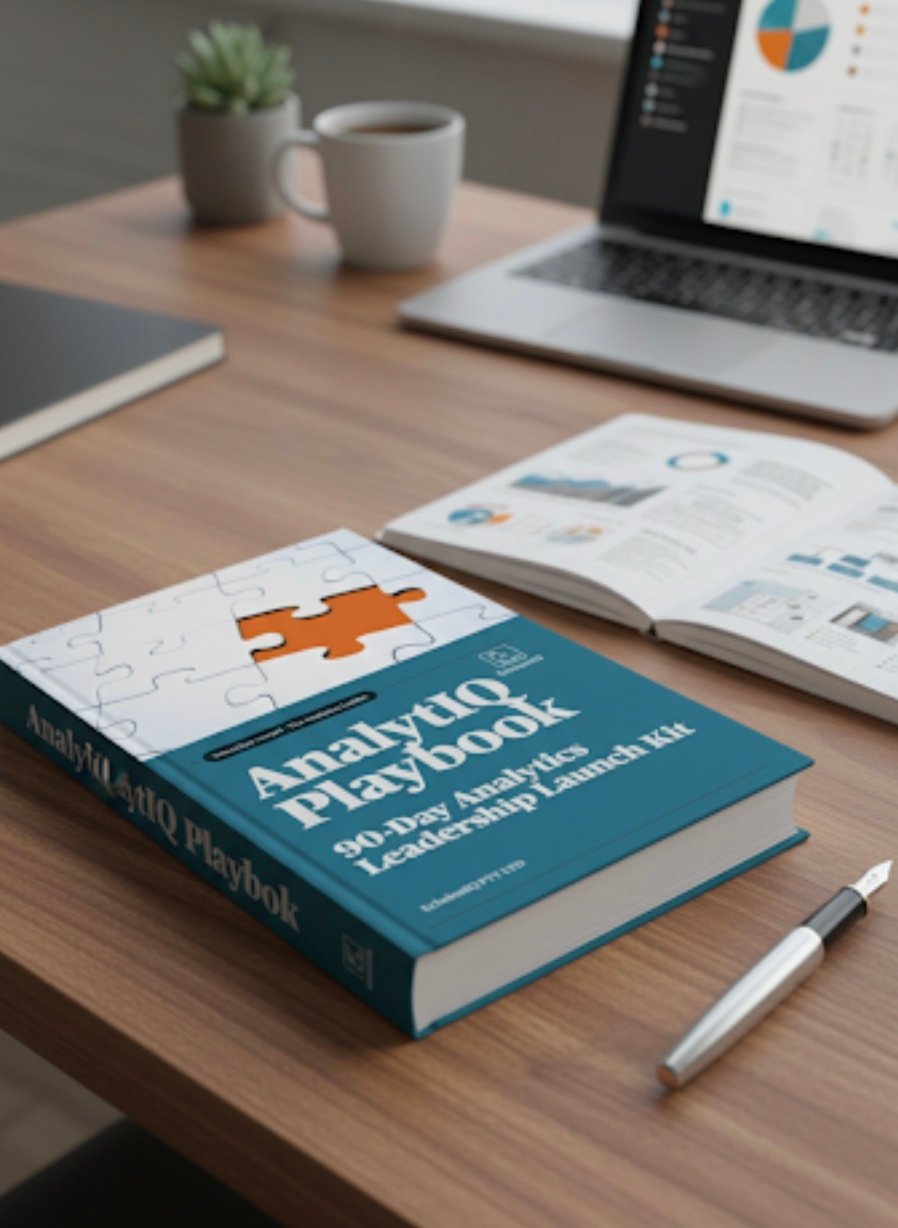- The Analytics Ladder
- Posts
- Your Data Doesn’t Matter if Nobody Acts: How Comfort and Authority Make You Indispensable
Your Data Doesn’t Matter if Nobody Acts: How Comfort and Authority Make You Indispensable
Your weekly playbook to climb faster, lead sooner and earn more.

It’s 10 minutes before your big presentation. Your SQL query is a masterpiece of efficiency, your dbt pipelines are clean, and the dashboard you built in Looker is polished to perfection. You've triple‑checked every metric.
You’re ready…..
Then, as you share your screen, the familiar tension kicks in.
You start talking faster, clicking through dashboards to show off the depth of your work.
You point to a critical chart, but the Head of Product just asks, "So what does this mean for next quarter's roadmap?"
Your complex analysis is met with a polite but disengaged nod. The insight you spent weeks uncovering gets lost in translation.
Sound familiar?
Most data professionals believe the solution lies in a more advanced statistical test, a new Python library, or a more intricate visualisation. But what if the real barrier isn't your technical skill, but your delivery?
From around the web..
How to Communicate Up, Down and Across the Organization with Impact | Think authority means flexing your KPIs? Laura Smith‑Dunaief argues the opposite: nothing builds credibility faster than owning your screwups and inviting your team to weigh in |
How to Not Be Nervous for a Presentation (13 Tips That Work) | Coach Elizabeth Perry’s simplest hack? Slow down like you’re telling a bedtime story to your dog; speaking 20 % slower calms you and keeps your audience awake |
HRM’s recap of Milgram’s obedience experiments reminds us we’ll even fake‑electrocute strangers if someone in a lab coat tells us |
For the last 7 weeks or so I have been down a rabbit hole consuming all the information I could find about the work of Chase Hughes, a former U.S. Navy Chief and behavioural science expert. His work with intelligence officers focuses on building influence, and in particular his ACSS model (Authority, Comfort, Social Skills, and Skills) seems to indicate why many data experts struggle to make an impact.
It has nothing to do with optimising your code and everything to do with building personal authority.
As self‑service BI and AI‑powered tools automate routine analysis, a data professional's value is no longer just in finding the answer, but in getting stakeholders to act on it.
Comfort and authority aren't just "soft skills"; they are your career's most valuable asset.
What made me decide to publish this issue? My last PCB (Project Control Board) meeting. Pretty high stakes, lots of power pushers in the room. I had been prepping for it for quite a while and I followed ALL the advice I have condensed in this issue. At the end - it was a game changer, this is something I am carrying forward as a major tool in the toolbox.
Give me the next six minutes, you'll get:
A breakdown of the ACSS model and why your technical skills have hit a point of diminishing returns.
A 7‑day challenge to rewire your nerves and make stakeholders listen.
A personal authority audit to make your credibility visible, not just assumed.
A simple action to take before your next sprint review to calm your nerves and command the room.
A new subscriber reward!
Let's go
Automation finds answers. You move people.
The ACSS Framework - Stop Optimising and Start Influencing
Hughes’ ACSS model flips the way most technical experts think about their value. It stands for:
Authority: Your perceived confidence, discipline, and leadership, not your job title.
Comfort: Your ability to stay relaxed and grounded, especially when challenged on your numbers. And yes, even when someone mispronounces ‘SQL’
Social Skills: Your capacity to build rapport and connect with non‑technical peers.
Skills: Your technical expertise (SQL, Python, dbt, stats), which are essential but powerless without the first three. (We wont be concentrating on these in this issue)
Hughes notes that 90% of his clients think they need another certification or technical skill. He tells them the hard truth: your competence isn't the problem, your comfort is. Stakeholders don't care about the elegance of your query; they care about the confidence with which you deliver the insight.
You can't fake this. Your authority is a byproduct of your daily habits. A desktop cluttered with untitled CSVs, a chaotic backlog of ad‑hoc JIRA tickets, or a disorganised Git repository all send a subconscious signal to your brain: "I'm overwhelmed" And it shows when you present.

ACSS and Beyond – The Psychology Behind Data Influence
Being brilliant at SQL isn’t enough; you need to be good at humans. Here’s how to upgrade your impact for the first three (Authority, Control, Social Skill):
Authority isn’t your job title; it’s how you show up. Leadership research suggests that credibility comes from balancing confidence with approachability, not from showing off your KPIs. Data pros can build authority by:
Tidy your house. A chaotic desktop or disorganised repo tells your brain and your stakeholders that you’re overwhelmed. A clean environment supports a calm presence.
Tell on yourself. Share lessons from failed experiments and invite input from teammates. Admitting you don’t have all the answers, and asking for theirs, makes you more trustworthy.
Borrow credibility. Don’t be shy about grounding your recommendations in respected frameworks or standards: “This metric follows Gartner’s guidelines for defining a North Star” It signals rigour and gives hesitant stakeholders something to hold on to.
Comfort: Slow Down to Speed Up
Being comfortable under pressure isn’t a soft skill; it’s the difference between a decision and a polite nod. Cognitive‑load research shows that when you bombard your audience with information, they stop hearing you. Chase Hughes’ “move slower than everyone else” challenge and the 20 % slower speaking rate recommended by presentation coaches are quick fixes with outsized impact. Try this:
Set the pace. Before a meeting, imagine walking a stakeholder through one key chart at a relaxed tempo. On calls, speak slightly slower than feels natural; it calms your nerves and helps listeners absorb your point.
Keep slides simple. Limit each slide to one insight. Complex visualisations and simultaneous narration overload working memory. Pause to let your audience catch up; silence is your friend.
Breathe and smile. Deep breathing delivers oxygen to your brain and keeps you focused; smiling releases endorphins and makes people more receptive to your message.
Social skills turn charts into conversations. Hughes reminds us that humans are tribal, people look to others for cues. Build rapport and social proof by:
Lead with empathy. Acknowledge stakeholders’ goals before diving into your analysis. It shows you’re on their side and primes them to listen.
Tell stories. Share how another team acted on a similar insight (“Marketing cut CAC by 10 % using this same trend”) to tap into social proof.
Invite voices. Encourage cross‑functional partners to speak up during your meetings. Giving others a spotlight builds connection and signals psychological safety.
By framing Authority, Comfort and Social Skills as daily habits rather than innate traits, you give your readers a clear roadmap for becoming data influencers. Each tip is rooted in Hughes’ core idea: mastering your own presence and relationships matters far more than another certification.
Bringing it together
The ACSS framework is a powerful lens, but it’s only the starting point.
Pairing authority and comfort with cognitive‑science principles like cognitive load, social proof, confirmation bias and reciprocity turns you from a data producer into a data influencer.
In an AI‑powered world, these human factors are what make your analysis stick.
And what make you indispensable.
The 7‑Day Comfort Challenge
Hughes gives every new client a simple task: for one week, move slower than everyone else.
Imagine you’re wading through CUSTARD, and that's your new speed limit. The fear of being wrong or misunderstood makes you rush. By intentionally slowing down, you signal to your nervous system that you are in control, and your audience will mirror your composure.
Custard!

Your 7‑Day Plan:
Set Your Tempo: Before each meeting, visualise yourself calmly walking a stakeholder through a single chart. This is your new pace.
Speak 20% Slower: When explaining a p‑value or a complex trend, pause after the key takeaway. Silence gives your audience time to process the information and invites questions.
Guide, Don't Click: In presentations, resist the urge to frantically click through filters and dashboards. Move your cursor deliberately, guiding your audience's eyes to one metric at a time.
Observe the Shift: Notice how stakeholders stop interrupting and start asking better questions. See how they lean in, trusting your interpretation of the data.
By day three, you'll feel more grounded. By day seven, people will say you have a gift for making complex data feel simple and actionable.
This isn't a presentation trick; it’s a biological hack for building trust.
Comfort is your tool for the moment; authority is your long‑term foundation.
Hughes identifies five traits of authority (confidence, discipline, leadership, gratitude, and enjoyment) that show up in five domains: environment, time, appearance, social life, and finances.
Your 15‑Minute Audit:
Score Yourself: On a scale of 1 to 10, rate yourself on each trait and in each domain. Is your environment (your messy project folder) your weakest link? Or is it time (your reactive, meeting‑filled calendar)?
Choose One Small Upgrade: This week, pick one tiny action. Organise your code in a new GitHub repo, block out two hours for deep work, schedule a coffee chat with a mentor, or document a complex data source for your team.
Make It Visible: Share your focus with your manager (e.g., "This week, my goal is to document our user event schema"). Accountability builds discipline.
Authority isn't about having all the answers.
It’s about creating a system in your life that projects calm and control, so your insights can finally be heard.
Start your journey towards a data leader on the right foot with our latest subscriber reward, The AnalytIQ Playbook: First 90 Days as an Analytics Leader. A concise guide packed with actionable strategies to set you up for success.
Download it today and tell us what you think as you put its insights into practice!
Today’s Move
This week, don't learn a new visualisation library. Don’t spend hours optimising a query that's most probably already fast enough.
Instead, do one thing: move and speak slower and more deliberately than everyone else in the room. (Pretend you are in a slow motion Matrix scene!?)
Try it in your next three meetings. Notice what happens.
Then, hit reply and tell me: Did your key takeaway finally land? I want to hear it.
The most valuable analysts aren't the ones with the most complex models.
They're the ones who can make data speak.
This is where it starts.
Best,
Tom
P.S. I’ve been quietly building a companion workbook that turns ACSS theory into daily practice, and hopefully it drops in next week’s issue. If you want it the minute it goes live, reply with “I’m in” and keep an eye on your inbox.
Know one teammate who’s drowning in rework or worried AI is eating their job? Forward this to them—you’ll help them climb and unlock the new referral reward: the Delta Teams Playbook, your crisis-mode toolkit when the wheels come off.
Not on The Analytics Ladder yet? You’re missing the brand-new 90-Day Analytics Leadership Action Kit. It’s free the moment you join - your step-by-step playbook to win trust in 14 days, build a system by day 45, and prove dollar impact by day 90.
Disclaimer: Some of the books, articles and excerpts referenced in this issue may be copyrighted material. They are included here strictly for review, commentary and educational purposes. We believe this constitutes fair use (or “fair dealing” in some jurisdictions) under applicable copyright laws. If you wish to use any copyrighted material from this newsletter for purposes beyond your personal use, please obtain permission from the copyright owner.
The information in this newsletter is provided for general educational purposes only. It does not constitute professional, financial, or legal advice. You use this material entirely at your own risk. No guarantees, warranties, or representations are made about accuracy, completeness, or fitness for purpose. Always observe all laws, statutory obligations, and regulatory requirements in your jurisdiction. Neither the author nor EchelonIQ Pty Ltd accepts any liability for loss, damage, or consequences arising from reliance on this content.
Visit our website to see who we are, what we do. | |
Our blog covering the big issues in deploying analytics at scale in enterprises. |

Social Skills: Make Data Human